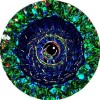Why I need this?
I have my own API for buttons (like direwolf20), but in my API you can specify everything (for example, color of background, color of text, code which will run when pressed, if the button is toggle or pulse…)
And first parameter is group, you must add button in group. I think it is usefull, you can have 3 buttons in one group and 5 in another. Now you can hide one group or display one group if another button is presses.
The way the buttons are stored is:
group = {["name"]={...a lot of properties...},["another button"]={..a lot of properties..}}
Now, I am creating user-friendly interface program for making buttons. User just enter group, text in button and click on monitor, to specify where the button will be. At the end computer will display code for him, now he can just copy and paste this code into his program. Problem is at begining I don't know group name.




